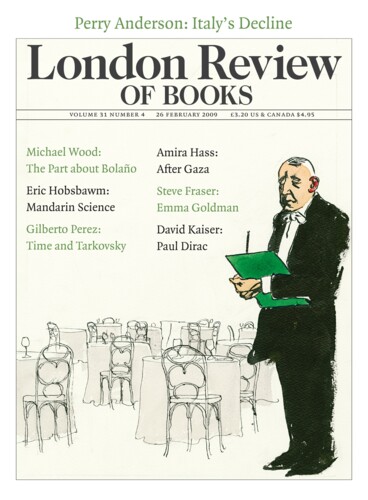It’s not easy to believe, but people used to think the Oscars didn’t matter. Now the hoopla takes up half a year, much longer if you take into account that many actors, writers and directors begin mugging for Oscars the moment they agree to a project. In previous times a respectable number of the nominees didn’t turn up at all, but now they would sooner be wheeled in semi-recumbent on their sickbeds than forgo the occasion altogether.
Looking at the movies the Academy prefers is like putting your eye up to the keyhole of the commercial culture; some would even say that examining them can give you the low-down on the political and moral atmosphere of the period. That, at any rate, is the rubric of Mark Harris’s excellent book Scenes from a Revolution: The Birth of the New Hollywood (Canongate, £8.99), which might justly claim to explain how Hollywood came to be what Hollywood has become. Harris takes the five movies nominated for Best Picture in 1968: Bonnie and Clyde, The Graduate, Guess Who’s Coming to Dinner, In the Heat of the Night and Doctor Dolittle. Each of them was for one reason or another tough to make: the material and its treatment were so new, or the audience wasn’t ready for it, or the creative team involved in making it was under pressure, muddled or more or less bonkers. In the case of Bonnie and Clyde and The Graduate, you had the joy of new scenes of violence or sex (or both) fighting their way onto the screen, with existential heroes lashing themselves to a newly emerging American sensibility. (Both Godard and Truffaut had been slated to direct Bonnie and Clyde before Arthur Penn got the job, while The Graduate had a male romantic lead who seemed to thrive on his ‘extraordinarily ordinary’ looks.) Guess Who’s Coming to Dinner and In the Heat of the Night both starred Sidney Poitier, who always looks nice, but in the year of Martin Luther King’s death – an event which held up the ceremony by two days – it was quite something to see two films in which a black man appeared not only to assert himself but to do so with a certain degree of moral disdain. In the Heat of the Night has a scene in which Mr Tibbs is slapped by a white man and slaps him right back: for many people, that was ‘1968’ writ large, and, through a fusillade of old-guard objections, along with objections from the new guard that it wasn’t enough, it seemed that the cinema might never be the same again. Doctor Dolittle, meanwhile, arrived to show that the overwrought, over-the-top, over-budget musical might still sail by like a glorious plastic ship, but it was dead in the water by 1968 and its nomination was nothing much more than a farewell.
This year, we might observe how the ‘issue movie’ has not only become an Oscars staple, but is the single biggest thing an Oscar-hungry movie can have going for it. Milk (starring Sean Penn, who is also nominated for Best Actor) is about the San Francisco gay rights martyr Harvey Milk; The Reader is a Holocaust drama laced with a coming-of-age narrative; Slumdog Millionaire, as Michael Wood said rather beautifully in the last issue, is about the ‘war on error’, revealing the desperate but ultimately triumphant lives of a group of poor children in modern Mumbai; Frost/ Nixon is about the showbusiness-ing of politics and about the demons that can stalk a powerful man; and The Curious Case of Benjamin Button is about the very moving experience of watching Brad Pitt start life as an old man and slowly become as beautiful as he was in Thelma & Louise. Oscars movies love suffering and they love demons. They love people dying for a good cause or agonising over their part in a bad one. They like cute children who overcome their disadvantages and are unapologetic about their native culture, so long as there is a big knees-up at the end. But what moves the Academy most is a sighting of its own royalty surviving the vicissitudes of time: at the ceremony in 1968, the money-shot, so to speak, was not Mike Nichols winning Best Director for The Graduate, but Katharine Hepburn winning Best Actress. Violence might be poetic, sex might be a form of loneliness, uh-huh, and racism might be a scar on the soul of the nation, but an elderly actress proving she’s still got the chops will get the tears flowing every time.
At the Oscars this year, we should see some good people winning for the wrong reasons and some cynical people winning for the usual ones. It’s all part of the enjoyment, but what might the five films nominated for Best Picture say about life in the wider Obamaverse? They might say that the past is always before us (Benjamin Button); that the terrible era of corrupt presidents is past (Frost/Nixon); that minorities are now prized in America (Milk); that the evils of Fascism are always present (The Reader); and that the world’s poorest people can still dance (Slumdog Millionaire). Whoever the winners are, the overwhelming feeling might be that, despite 1968, despite Obama, despite our several revolutions, nothing moves Hollywood like Hollywood itself. If you can’t buy that you shouldn’t be watching the Oscars, or oiling the wheels of the place where you sleep and dream.
Send Letters To:
The Editor
London Review of Books,
28 Little Russell Street
London, WC1A 2HN
letters@lrb.co.uk
Please include name, address, and a telephone number.

